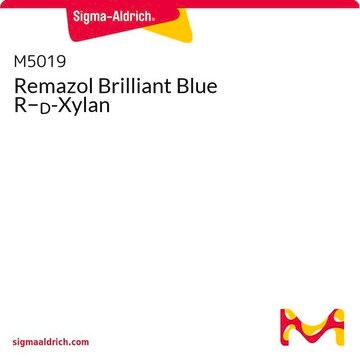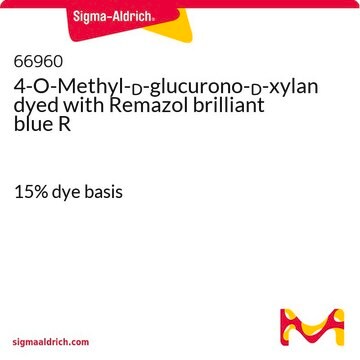X4252
Xylan from beechwood
≥90% (HPLC), cell wall polysaccharide
Synonym(s):
Poly(β-D-xylopyranose[1→4])
Sign Into View Organizational & Contract Pricing
All Photos(1)
About This Item
Recommended Products
biological source
synthetic
Assay
≥90% (HPLC)
form
powder
mp
300 °C
General description
Major component of plant cell wall hemicellulose. Polysaccharide primarily consisting of xylose and arabinose.
Quality
>90% xylose residues
Storage Class Code
13 - Non Combustible Solids
WGK
WGK 3
Flash Point(F)
Not applicable
Flash Point(C)
Not applicable
Personal Protective Equipment
dust mask type N95 (US), Eyeshields, Gloves
Certificates of Analysis (COA)
Search for Certificates of Analysis (COA) by entering the products Lot/Batch Number. Lot and Batch Numbers can be found on a product’s label following the words ‘Lot’ or ‘Batch’.
Already Own This Product?
Find documentation for the products that you have recently purchased in the Document Library.
Hitomi Ichinose et al.
Applied microbiology and biotechnology, 80(3), 399-408 (2008-07-31)
A gene encoding an alpha-L-arabinofuranosidase, designated SaAraf43A, was cloned from Streptomyces avermitilis. The deduced amino acid sequence implies a modular structure consisting of an N-terminal glycoside hydrolase family 43 module and a C-terminal family 42 carbohydrate-binding module (CBM42). The recombinant
K B Bastawde
World journal of microbiology & biotechnology, 8(4), 353-368 (1992-07-01)
Xylans, the major portion of the hemicellulose of plant cell walls and grasses, are heteropolymers consisting principally of xylose and arabinose. Microbial xylanases with different multiplicities and properties are reported. Most studies on the mode of action of these xylanases
Kai Chi et al.
Nanoscale, 9(39), 15144-15158 (2017-10-04)
Acid hydrolyzed bacterial crystalline nanocellulose (BCNC) with different nanofiber morphologies, geometrical dimensions, crystalline structure and mechanical properties were obtained by adding different polysaccharides into the growing culture medium. Arabinogalactan had little effect on the characteristics of BCNC due to its
Rui Ma et al.
Journal of agricultural and food chemistry, 65(6), 1139-1145 (2017-01-10)
Xylooligosaccharides as emerging prebiotics are able to promote the growth of probiotic bacteria. In the present study, four neutral, thermostable xylanases (MtXyn11A, MtXyn11At, MtXyn11B, and MtXyn11C) from compost fungus Mycothermus thermophilus CGMCC3.18119 were overexpressed in Pichia pastoris GS115 and used
Paul Daly et al.
Fungal genetics and biology : FG & B, 102, 4-21 (2016-05-07)
Gaining new knowledge through fungal monoculture responses to lignocellulose is a widely used approach that can lead to better cocktails for lignocellulose saccharification (the enzymatic release of sugars which are subsequently used to make biofuels). However, responses in lignocellulose mixed
Our team of scientists has experience in all areas of research including Life Science, Material Science, Chemical Synthesis, Chromatography, Analytical and many others.
Contact Technical Service




